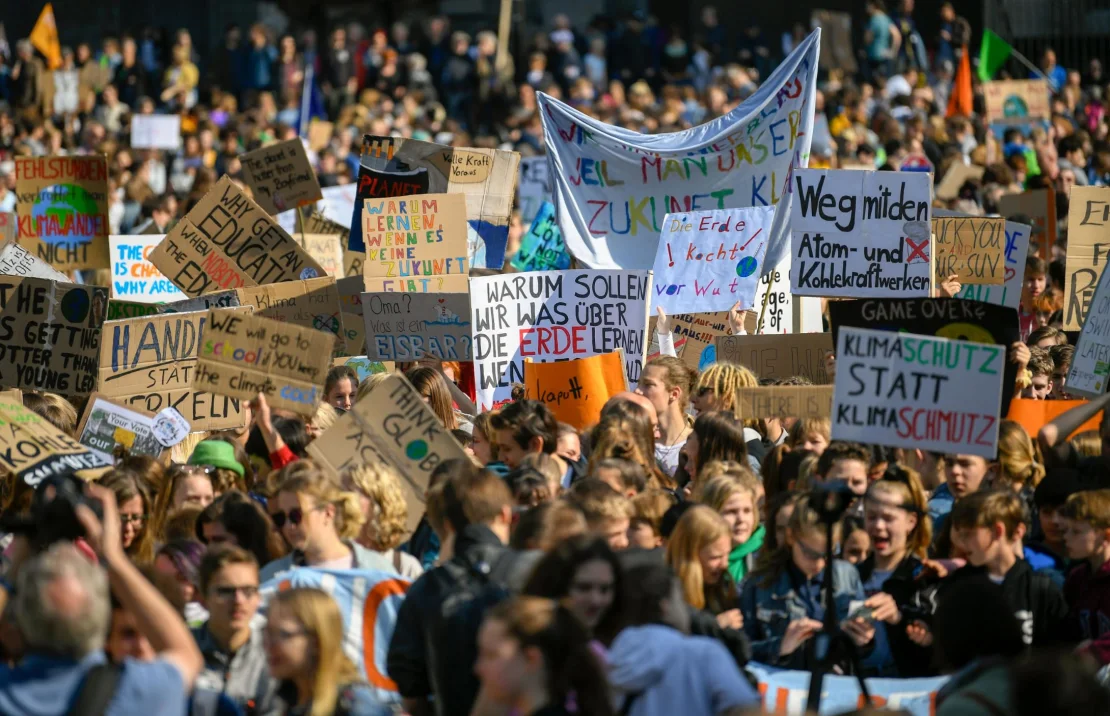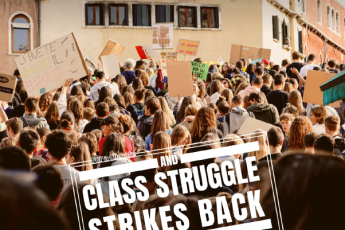
by CLIMATE CLASS CONFLICT
The urgency of the climate crisis is as present as the urgency of organising against it. Thousands of activists meet regularly to discuss how to express their rejection of the catastrophic fate that governments around the world claim to be facing with environmental policies that hide racist, sexist, and more exploitative measures. The mass presence of millions of people on climate strikes in squares and streets around the world now belongs to the past. In the gap between today and five years ago, what affects our capacity to struggle is the absence of that climate movement that, through the Global Climate Strike and months of mobilisations around the world, imposed the urgency and centrality of the ecological issue. The objective difficulty of maintaining and extending the strikes, of giving them continuity over time by opening them up to other issues and social struggles, goes hand in hand with the organisational fragmentation in which we are all now involved. There are so many climate struggles, rebelling against so many different situations, with more or less success. But all these struggles are experiencing difficulties in making meaningful connections.
It is therefore time to ask ourselves: What happened to the climate movement? What happened to the movement that could raise the issue of putting an end to a system that, precisely because it pollutes, exploits, and subordinates millions of people everywhere, cannot be fought from a single place and its irrepressible specificities? These questions have become particularly urgent for us in recent months. Two years ago, within the Transnational Social Strike Platform, we launched the Climate Class Conflict initiative. This organising space has brought together militants, climate activists, and workers from across Europe in an effort to build a transnational struggle capable of rejecting from a class perspective a capitalist green transition that claims to shift the effects of the climate crisis onto workers, women, and migrants. Precisely because of the limitations and difficulties we face in this initiative, we believe it is necessary to raise the political and organisational problem of the state of the climate movement.
The EU Green New Deal has convinced very few, starting with its self-proclaimed ‘green’ character, but it has had a strong impact on the lives of many people. From the outset, it presented itself as an industrial restructuring of the European market and its energy infrastructure, that is, it presented itself as a set of regulations useful for the establishment of a new ecological regime of capital accumulation. We continue to believe that within this contested field, we should seek the lines of rupture and confrontation on which to build a climate class movement. Important fragments of this movement have emerged in opposition to the relocation of companies from Western Europe to Eastern Europe, where the excuse of the green transition is used to sack workers in search of lower wages and higher profits. Again, in countries such as Bulgaria, Poland, Romania, and the Czech Republic, miners rebelled against the fact that the closure of production sites was touted by national governments as a step towards creating a business-friendly environment.
A popular slogan these days is that workers’ struggles and climate struggles are connected. We share this slogan, but we think it does not solve the problem of how to build this connection. We don’t believe, for example, that it can be limited to the local level because the organisational challenge we face goes beyond the search for models and exemplary cases. Even less can it be put on the back burner in favour of alliances that don’t deal with the contradictions and differences that affect our side. It is clear to everyone that the climate crisis is not a local issue. That is why we cannot abandon the search for points of contact and possible channels of communication between experiences that are different from each other, but which are part of a transnational political space in which we are immersed. This space is now being radically transformed in the scenario of a Europe at war, within which national differences are hardening and the meaning and direction of every field of institutional intervention are being redefined. The politics of green transition have not been sidelined, but are increasingly intertwined everywhere with ‘strategic’ national interests and new global geopolitical alliances, even when these mean a relegitimization of fossil policies. Meanwhile, at the ideological level, militarism and right-wing parties’ surges have led to harsh repressions of climate protests. Previously closed mines or oil extraction sites are now being reopened, while the interests of the capitalists in certain industrial sectors crucial to the ecological transition (such as the car industry and agriculture) are being safeguarded because the climate can wait but profits cannot.
It is in this space, squeezed by war and punctuated by imposed goals and urgencies, that we want to fight to change both. We have the problem of how to deal with an issue, the climate issue, that affects the whole world but is difficult to deal with even when it affects very specific places and people. Whether it’s the big demonstrations against the expansion of the Lützerath mine, the one in Sainte-Soline against the privatisation of water, or even the more recent actions against the expansion of the Tesla factory in the woods around Berlin, we keep coming up against the same wall. Even when many people come together in one place because they recognise the importance of a local cause in the global struggle for climate justice, not only do we rarely get immediate results, but the action is almost always followed by a scattering of the forces gathered and further fragmentation of our side. The problem is to break out of this repetition and find ways to build a force that doesn’t run out at the end of each initiative, but can stay and feed on discourses and practices relevant to the challenges and contradictions we face.
Many camps and initiatives are planned for the coming weeks. Many activists are already coming together in Italy, France, Germany, and many other places to share experiences of struggle and the goals that the climate movement should pursue. We believe that the differences that divide and weaken us can only be transformed into a collective force by fostering a process of transnational communication and organisation between activists, workers, migrants, and local workers. Comrades who have been part of the Climate Class Conflict network and its initiatives in recent years are taking part in these events because we believe that each of them is fundamental to reopening processes that are as urgent as ever. At the same time, these moments will be precious for the months to come if we realise that the local dimension alone will not save us from the difficulty of influencing the processes and relations of subordination that today make it seem impossible to escape the climate crisis, its effects, and its capitalist government.
You can reach out to us at @tssplatform on Instagram or Facebook, at the e-mail address info@transnational-strike.info





